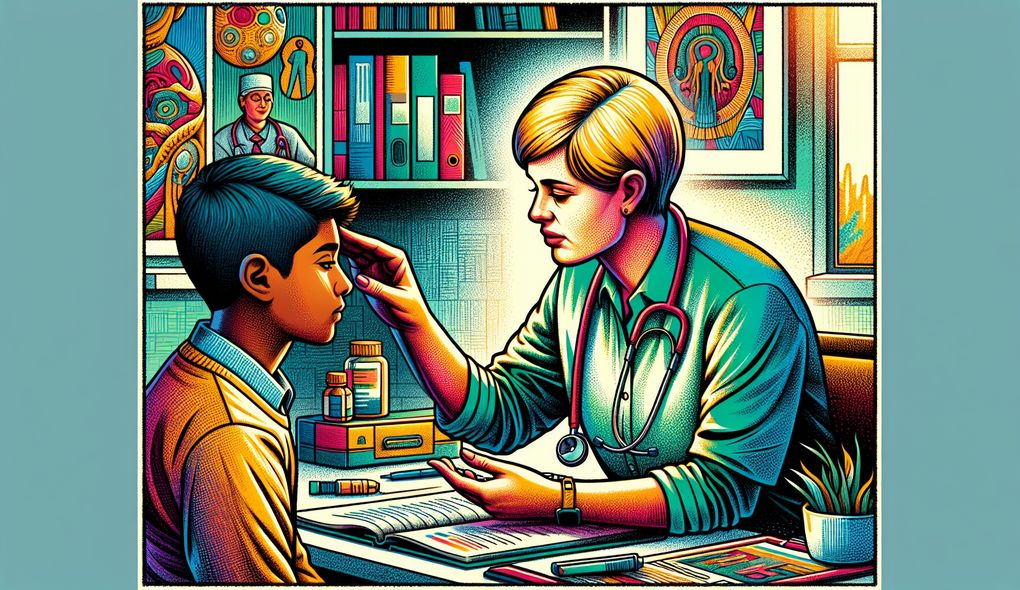Describe a situation where you had to advocate for the healthcare needs of an adolescent patient.
JUNIOR LEVEL

Sample answer to the question:
I had an experience where I had to advocate for the healthcare needs of an adolescent patient who was experiencing mental health issues. The patient was struggling with anxiety and depression, which were affecting their daily life and overall well-being. I took the initiative to collaborate with the patient's family, school counselor, and mental health professionals to create a comprehensive care plan. I ensured that the patient received regular therapy sessions and medication management. Additionally, I worked with the patient's school to implement accommodations and support services to promote their academic success. Through ongoing communication and coordination, I advocated for the patient's healthcare needs and helped them regain control over their mental health.
Here is a more solid answer:
During my time as a nurse practitioner, I encountered a situation where I needed to advocate for the healthcare needs of an adolescent patient who was struggling with a chronic illness. Understanding the unique challenges faced by adolescents, I engaged in open and empathetic communication with the patient and their family to establish trust and gain insight into their needs. Through comprehensive assessments and regular follow-ups, I closely monitored the patient's condition and provided education on disease management to empower them in taking control of their health. Recognizing the importance of a multidisciplinary approach, I collaborated with the patient's healthcare team, including specialists, therapists, and school nurses. Together, we developed a comprehensive care plan that addressed the physical, emotional, and educational needs of the patient. By advocating for necessary accommodations and support services at school, I ensured a supportive environment that facilitated the patient's academic success. Continuously evaluating the effectiveness of the care plan, I made adjustments to optimize the patient's health outcomes. This experience highlighted the significance of strong communication, knowledge of adolescent growth and development, and competency in managing complex health concerns to effectively advocate for the healthcare needs of an adolescent patient.
Why is this a more solid answer?
The solid answer provides specific details about the steps taken to advocate for the adolescent patient, including open communication, trust-building, and collaboration with the healthcare team. It also demonstrates a good understanding of the unique challenges faced by adolescents and emphasizes the importance of comprehensive care. However, it can further improve by including more examples of specific actions taken and their outcomes.
An example of a exceptional answer:
In my role as a Adolescent Medicine Nurse Practitioner, I encountered a situation where I had to advocate for the healthcare needs of an adolescent patient who faced multiple complex challenges. The patient was a transgender teenager who was dealing with both physical and mental health issues related to their gender identity. Understanding the sensitive nature of their situation, I approached it with utmost respect, empathy, and cultural sensitivity. I engaged in open and nonjudgmental conversations, allowing the patient to share their experiences, concerns, and goals. By creating a safe space, I built a strong therapeutic alliance that helped me understand their unique healthcare needs. Recognizing the importance of providing gender-affirming care, I collaborated with specialists in transgender healthcare to ensure the patient received appropriate medical interventions, including hormone therapy. Simultaneously, I addressed the patient's mental health needs by connecting them with a therapist who specialized in working with transgender individuals. Understanding the importance of the patient's social support, I worked closely with their family and school to provide education and promote acceptance and inclusion. Through ongoing communication and advocacy, I successfully coordinated access to transgender-specific resources, support groups, and community organizations. This comprehensive approach not only improved the patient's physical and mental well-being but also empowered them to lead a fulfilling life. This experience demonstrated my strong communication and interpersonal skills, deep understanding of adolescent growth and developmental stages, and competency in managing complex adolescent health concerns, especially those related to gender identity.
Why is this an exceptional answer?
The exceptional answer goes above and beyond in addressing the specific requirements of the job. It showcases the candidate's expertise in advocating for the healthcare needs of an adolescent patient with a complex case involving transgender healthcare. The answer demonstrates exceptional communication skills, cultural sensitivity, collaboration with specialists, and promoting inclusivity and acceptance. It also highlights the candidate's knowledge of adolescent growth and developmental stages and competency in managing complex adolescent health concerns.
How to prepare for this question:
- Study adolescent growth and development stages to better understand the unique healthcare needs of this population.
- Familiarize yourself with the current best practices and guidelines in adolescent healthcare, particularly in areas such as mental health, sexual health, and substance abuse.
- Research the specific challenges faced by transgender adolescents and the healthcare interventions and resources available for gender-affirming care.
- Reflect on your past experiences where you have advocated for the healthcare needs of adolescent patients and think about the specific actions you took, the outcomes achieved, and any challenges you encountered.
- Practice discussing these experiences in a clear and concise manner, highlighting your communication, collaboration, and problem-solving skills.
What are interviewers evaluating with this question?
- Strong communication and interpersonal skills
- Knowledge of adolescent growth and developmental stages
- Competency in managing adolescent health concerns, including mental health issues

